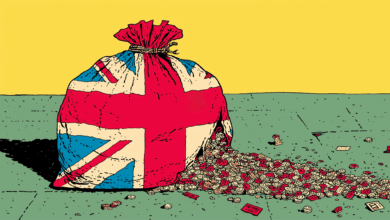Zack Polanski Plays the Populist Card

For Trumpians, tariffs have become an all-purpose tool, which supposedly achieves multiple policy objectives all at once. Tariffs are presented as an easy way to raise revenue (“a tax on a foreign country”). They are also presented as a tool to discourage imports, and thereby stimulate domestic production. Thirdly, tariffs are also presented as a tool to get foreign governments to do what Trump wants them to do.
In my ideal world, tariffs would not exist. But this article is not about my ideal world. My issue with the above logic is that it does not work on its own terms. Tariffs could, in principle, achieve one of the above aims. They cannot really achieve two of them, and they certainly cannot achieve all three.
If you want to use tariffs like sanctions, you have to repeal them again as soon as the foreign government you are targeting complies with your demands. Otherwise, those foreign governments have no incentive to do so. But once you have abolished them, they can neither raise revenue, nor discourage imports.
The latter two aims are also in conflict with one another. To the extent that tariffs succeed in discouraging imports, they cannot raise revenue. The tariff paid on imports that don’t happen is zero. Tariffs can only raise revenue to the extent that imports continue, and to the extent that they do, there is no stimulus for domestic production.
Fortunately, Trumpism is extremely unfashionable in Britain, so his fallacies only affect us indirectly. However, while Britain seems relatively immune to Trumpian populism, it has no immunity whatsoever to the populism of the socialist Left, and Britain’s socialist Left has a close equivalent to what tariffs are to the Trumpian Right: the wealth tax.
For sections of the British Left, the wealth tax has become an all-purpose tool, which supposedly achieves multiple policy objectives all at once. It is presented as an easy and painless way to raise revenue for a raft of spending programmes, from a “properly funded” NHS to the “green transition.” It is also presented as a way to rebalance the tax system, as embodied in the slogan “tax wealth, not work.” And thirdly, it is presented as a way to reduce the concentration of wealth, and make sure wealth is spread more evenly.
In my ideal world, wealth taxes would not exist. But again, this article is not about my ideal world. My issue with the above logic is that it does not work on its own terms. A wealth tax could, in principle, achieve one of the above aims. It cannot really achieve two of them, and it certainly cannot achieve all three.
The first two arguments rely on the assumption that wealthy people will not noticeably change their behaviour after the introduction of a wealth tax. They will just hand over the money to the government, and otherwise, they will keep doing whatever it is that they do now.
But if a wealth tax is supposed to fulfil the third objective and reduce wealth concentration, it must drastically change the way people behave. At least for some proponents of the wealth tax, that is the whole point.
Just last night, the leader of the Green Party, Zack Polanski, appeared on BBC Question Time and defended wealth taxation on these grounds, proclaiming that it is “time for a tax on the super rich,” which could “drastically reduce inequality.” Britain, Polanski said, should not be a “corporate sink for people to just have wealth.”
Another vocal proponent of that view is Gary Stevenson. Stevenson argues that the reason why ordinary people cannot afford a house is that the super-wealthy are buying up all the housing stock. He is wrong about that—but that’s not what this article is about. For the purposes of this article, let’s just go along with it.
Stevenson believes that a wealth tax will push the housing Kulaks to sell all those properties they are currently hoarding. That’s a behavioural change. Stevenson’s argument rests on the assumption that the wealthy are highly responsive to tax incentives, and that they will respond to the wealth tax by minimising their taxable wealth—the exact opposite of what wealth tax proponents usually assume.
To the extent that the wealthy really do sell their surplus assets, a wealth tax cannot raise revenue. In Stevenson’s world, a wealth tax is form of a sin tax, a tax that is meant to discourage “sinful” behaviour. Tobacco duty is meant to discourage smoking, alcohol duty is meant to discourage drinking and a Stevensonite wealth tax is meant to discourage asset-hoarding. Sin taxes are not meant to raise revenue, and they only do so insofar as they fail to achieve their primary objective. You don’t pay tobacco duty on cigarettes that you don’t smoke, you don’t pay wine duty on wine that you don’t drink and you don’t pay wealth tax on assets that you don’t own.
Today’s wealth tax proponents rely on a Schrödinger’s Billionaire, who responds to the wealth tax by selling all their excess assets, but who also keeps those assets and pays tax on them.
Even if Schrödinger’s Billionaires existed, though, it would not solve all the contradictions around wealth taxes. Its proponents sometimes talk about the wealth tax as a substitute for other taxes, implying it is meant to be revenue-neutral (“tax wealth, not work”). But they then also use it as the basis for a long list of spending promises. I don’t know whether anyone is keeping track of all the extra spending that a wealth tax is allegedly going to fund under a future eco-socialist government, but I am sure it already adds up to at least dozens, and more likely, hundreds of billions.
There is currently only one country in the world which manages to raise more than 1% of GDP via a wealth tax (namely Switzerland, and even there, only just). If we could replicate that here (which I don’t think we could), it would bring in close to £30bn per annum. For an ordinary tax reform, that would be quite a lot of money, sure. But when you combine it with open-ended promises to throw money at various bottomless pits, such as “the green economy” and the NHS—it’s really not that much. If you use a wealth tax in that way, you are certainly not going to have any leftovers to ease the tax burden on plumbers and hairdressers.
If you support a wealth tax because you believe in just one of its stated objectives in isolation—fair enough. This article is not about you, then. The problem is that for many of its supporters, the wealth tax has become what the Germans call an eierlegende Wollmilchsau, a pig that grows wool, produces milk and also lays eggs. If they presented it as a merely way to raise a bit of extra money, that would be one thing. But no: the wealth tax will, apparently, solve the housing crisis, fund the NHS, decarbonise the economy, solve the social tensions around immigration and once it has done all that, there will still be plenty of money left to ease the tax burden for everyone else.
Needless to say, no wealth tax anywhere in the world has ever achieved anything close to what its current proponents are promising. But then—when has sobering past experience ever dented the confidence of socialists that it will all work out brilliantly next time?
This article originally appeared at CapX.
The post Zack Polanski Plays the Populist Card was first published by the Foundation for Economic Education, and is republished here with permission. Please support their efforts.



